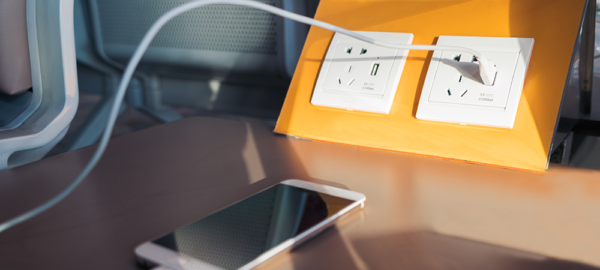 When people think of cybersecurity attacks, most people think of compromised network connections, phishing emails, and malicious websites. Hardly do people think of the possibility of a cybercriminal hijacking a public Universal Serial Bus (USB) charging station.
When people think of cybersecurity attacks, most people think of compromised network connections, phishing emails, and malicious websites. Hardly do people think of the possibility of a cybercriminal hijacking a public Universal Serial Bus (USB) charging station.
Juice jacking is a form of cyber-attack carried out through a USB which when connected to the charging port of a device enables hackers to obtain all of the owner’s personal information or upload some malware onto the device.
Multiple news outlets are reporting on this scare, saying that cases of juice jacking are rising. However, there is little, if any, evidence to support this.
FBI Asks The Public to Avoid Free Charging Stations
However, the FBI has recently warned travelers against using public charging stations due to the possibility of these stations being used to introduce malware or tracking software to devices.
Through a tweet, the FBI said,” Avoid using free charging stations in airports, hotels or shopping centers. Bad actors have figured out ways to use public USB ports to introduce malware and monitoring software onto devices.”
They further advised, “Carry your own charger and USB cord and use an electrical outlet instead”.
Avoid using free charging stations in airports, hotels or shopping centers. Bad actors have figured out ways to use public USB ports to introduce malware and monitoring software onto devices. Carry your own charger and USB cord and use an electrical outlet instead. pic.twitter.com/9T62SYen9T
— FBI Denver (@FBIDenver) April 6, 2023
A post on the FBI website reiterates this warning while providing more precautionary advice to internet users in general. The FBI additionally urges users to beware of public networks and refrain from conducting sensitive transactions such as buying goods online over the public internet.
While the warning made no mention of any recent incidents of juice jacking harming consumers, according to the FBI’s Denver field office, the tweet served as a cautionary note, and there was no particular incident that led to it.
The Federal Communication Commission (FCC) has been warning about juice jacking since 2021. On a consumer warning, the FCC called juice jacking “a new cyber-theft tactic” adding that “malware installed through a dirty USB port can lock a device or export personal data and passwords directly to the perpetrator.”
A Difficult Attack to Execute
Even though several government agencies, including the Los Angeles District Attorney, have issued similar warnings over the years, none can cite a confirmed case of it happening. This type of attack is hard to execute because most phones have a feature that stops it.
As a preventative measure, users are advised to avoid charging their devices at public charging stations or avoid using the cables located at these stations. Instead, users can carry their own cables or invest in a power bank or portable charger.
In the event one uses an unknown cable or the public charging station, they are advised to check their phones for any abnormalities immediately after. This will aid in detecting an attack or malware and taking the necessary steps to get rid of it.
Related Articles:
- Chinese EV Maker NIO Rolling Out 100 Swappable Battery Stations in Europe in 2023
- Tesla Software Update – Major Changes Coming to User Interface And More
- Brinc Drones Achieves $300m Valuation, Will Benefit From DJI Being Sanctioned
What's the Best Crypto to Buy Now?
- B2C Listed the Top Rated Cryptocurrencies for 2023
- Get Early Access to Presales & Private Sales
- KYC Verified & Audited, Public Teams
- Most Voted for Tokens on CoinSniper
- Upcoming Listings on Exchanges, NFT Drops